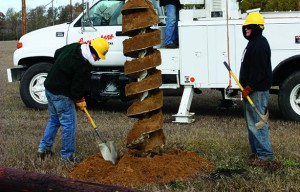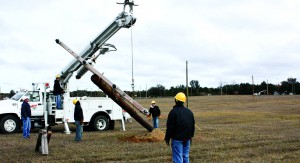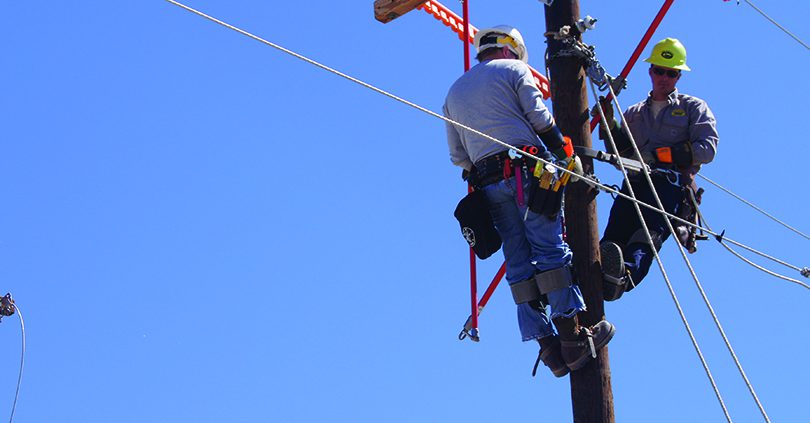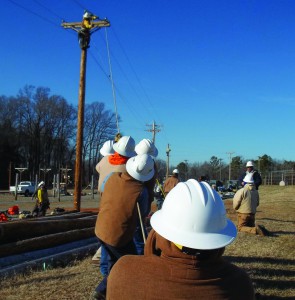The Next Generation of Lineworkers
By Justin LaBerge
Over the next five years, America’s electric cooperatives expect to hire nearly 15,000 people to fill jobs ranging from information technology specialist to lineworker. Investor-owned utilities, municipal power systems and private power line contractors will also need thousands of skilled workers to keep our nation’s energy grid running safely and reliably.
Despite high demand, good pay, excellent benefits, opportunities to advance and a stable long-term outlook, America is facing a shortage of lineworkers.
To address this looming shortage, energy companies, including America’s electric cooperatives, teamed up to create the Center for Energy Workforce Development. Even celebrities took notice. Mike Rowe, who gained fame as host of the Discovery Channel’s series “Dirty Jobs,” created a foundation to raise awareness of the great career opportunities offered by skilled trades that are too often overlooked by guidance counselors and eager parents.
Trade groups and celebrities can raise awareness of an issue, but it takes more than awareness to keep the lights on. Training programs are the vital link to help motivated individuals become our nation’s next generation of lineworkers.
No “typical” student
In Colorado, we have some notable lineworker training programs, such as Mesa Hotline School and Western Colorado Community College, both in Grand Junction, and Rocky Mountain Lineman School in Trinidad.
 At lineworker school, students learn about safety, underground and overhead procedures, installation, repair, operation of equipment, pole climbing and more important aspects of this skilled profession.
At lineworker school, students learn about safety, underground and overhead procedures, installation, repair, operation of equipment, pole climbing and more important aspects of this skilled profession.
A common thread through these programs is that they attract students from all walks of life. Many are young people who recently graduated from high school. Others are older and have more experience.
The older students tend to be a mix of individuals looking for a better job with advancement opportunities, workers who were laid off from manufacturing jobs and veterans who recently completed their military service. No matter their background, all students in these programs must love the outdoors and have a strong work ethic.
The tuition assistance options for lineworker programs are almost as diverse as the students themselves. For apprentice lineworkers already employed by co-ops, the tuition for these programs is often paid in full by the co-op. Returning veterans can use GI Bill funds, and many states have additional programs to help veterans enter the civilian workforce. Manufacturing workers who lost their jobs to companies overseas might be eligible for job-retraining funds.
In addition to these specialized types of financial assistance, lineworker training programs typically qualify for all the traditional education funding sources, including scholarships, grants and student loans.
Even those who rely on loans and their own funds to pay for their lineworker education will benefit from the much lower costs of community colleges as compared to four-year schools and private, for-profit colleges.
Genuine opportunity
In a September 26, 2015, column published by Education and Career News, Mike Rowe wrote: “Every day, millions of people looking for work fail  to consider a host of genuine opportunities, in part because they don’t appear on our collective list of ‘top jobs.’ Job satisfaction is important, but ultimately, vocational happiness has less to do with what you do than with who you are. In other words, character — like opportunity — won’t be found on a list.”
to consider a host of genuine opportunities, in part because they don’t appear on our collective list of ‘top jobs.’ Job satisfaction is important, but ultimately, vocational happiness has less to do with what you do than with who you are. In other words, character — like opportunity — won’t be found on a list.”
Few organizations value character as much as America’s not-for-profit, member-owned electric cooperatives, and lineworker is just one of the many “genuine opportunities” they offer.
Justin LaBerge writes on consumer and cooperative affairs for the National Rural Electric Cooperative Association.




